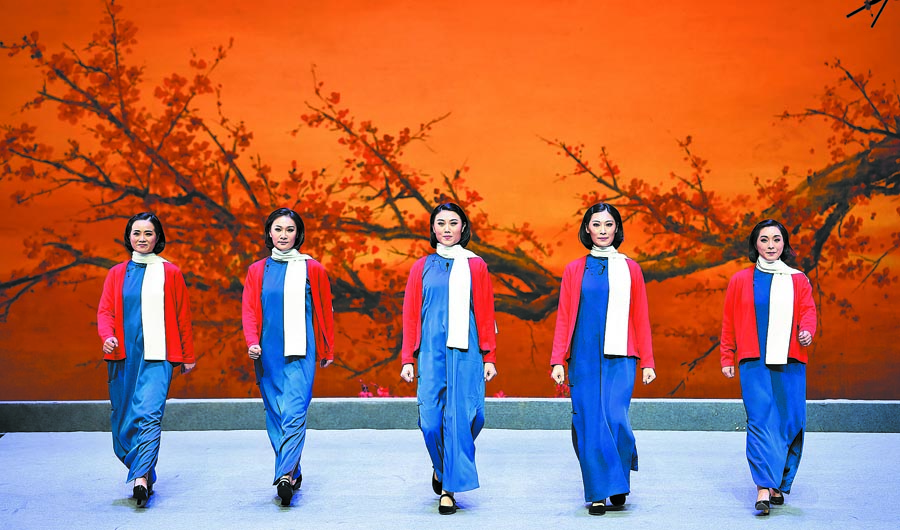Art exhibitions, live shows mark Party's anniversary
 0 Comment(s)
0 Comment(s) Print
Print E-mail China Daily, July 2, 2021
E-mail China Daily, July 2, 2021

Range of productions
Performances featuring a range of art forms, including classical music, operas, dramas and traditional Chinese operas, are being held to celebrate the CPC's centenary.
Daughter of the Party, a classic Chinese opera based on the eponymous 1958 movie, is being restaged at the NCPA in Beijing from July 13 to 18.
Telling the story of Tian Yumei, a Party member who devoted her life to protecting guerrilla soldiers during the Agrarian Revolutionary War (1927-37), the opera premiered in 1991 and featured a star-studded creative team. It won widespread critical acclaim, receiving the Wenhua Award in 1992, a top national accolade for the performing arts.
The new version, directed by Wang Jun, who co-directed the production in 1991, features soprano Lei Jia in the lead role of Tian.
Lei, who was born in Yiyang, Hunan province, in 1979 and studied huaguxi, or "flower-drum opera", an operatic style from the Hunan area, said,"All the songs from the opera are classic and I learned them as a student."
In 1997, Lei entered the China Conservatory of Music for undergraduate studies. She was later admitted to the People's Liberation Army Political Department's Song and Dance Ensemble, establishing her career as a soloist.
"I was trained by veteran Chinese singers who had performed classic roles in Chinese operas. They not only taught me how to sing but also inspired me to learn about the spirit of heroes," Lei said.
She is known for her performances in Chinese operas, including The White-Haired Girl, which premiered in Yan'an, a revolutionary base in northwest China, in 1945. Lei also featured in Mulan, which premiered in Beijing in 2004 and centers on the folktale heroine Hua Mulan, who disguised herself as a man in place of her ailing father in the army and saved her country from invaders.
In addition to Daughter of the Party, other productions, including original dance dramas, plays, ballets and symphony concerts, are being staged at the NCPA throughout the year to celebrate the Party's centenary.
Jiang Zhuyun, also known as Sister Jiang, an underground member of CPC and revolutionary martyr, is a well-known name in China. Her story has been adapted into various art forms, including a movie and Chinese opera. A Peking Opera production of Jiang's life, featuring renowned performer Zhang Huoding in the leading role, premiered in 2001.
On Sunday, five of Zhang's students, including Ma Fengfeng and Zheng Xuelian, performed the role of Sister Jiang in a concert at the Poly Theater in Beijing as part of events staged by the National Academy of Chinese Theater Arts to mark the CPC's centenary.
Zhai Qian, a singer with Dalian Peking Opera Company, who graduated from the academy in 2017 with a master's in Peking Opera performance, and is one of Zhang Huoding's students, said:"Jiang's story not only appeals to the older generation, but also attracts younger audiences. Jiang is a hero and she is also a mother. The music is very expressive in portraying the female hero."
In 2002, the production was staged at the German World Art Festival, and Zhang said in an earlier interview that it is a contemporary Peking Opera production performed in the Cheng School style.
"The performing style of the Cheng School is known for interpreting graceful female roles. Sister Jiang is a heroic woman and the role fits well with this style," said Zhang, who was born in Baicheng, Jilin province, and performed with the National Peking Opera Company from 1995 to 2008.
The 50-year-old now teaches at the National Academy of Chinese Theater Arts in Beijing. She was trained by Peking Opera master Zhao Rongchen and maintains the traditions of the Cheng School, a performing style founded by Cheng Yanqiu (1904-58). It is one of the four major Peking Opera styles to emerge in the early 20th century.
In 2016, the National Academy of Chinese Theater Arts launched a project that enabled Zhang to mentor young female Peking Opera students in the Cheng style.
On March 25, Beijing People's Art Theatre, which was founded in 1952, premiered its play The Night at the Fragrant Hills at the Capital Theater in Beijing to mark the CPC's centenary.
The Party made the Fragrant Hills in western Beijing its headquarters for six months as it emerged victorious in the War of Liberation (1946-49).
Featuring veteran actors Fang Xu and Wang Ban, the production, directed by Ren Ming, president of the theater, and written by Li Baoqun, is being staged for a second time at the Capital Theater from June 17 to Sunday.
Wang Ban, who plays Mao Zedong, and Fang, in the role of Chiang Kai-shek, enter a "dialogue" across time and space. The play follows events on the night after the People's Liberation Army occupied Nanjing in April, 1949, declaring the collapse of Kuomintang rule. The liberation of Nanjing is a highly symbolic event in the history of the Party, the military and the nation.
Li, the scriptwriter, said, "I was commissioned to write the play in 2019 and I was intrigued by the idea of having these two characters talk overnight-presenting a view of Chinese history."
He conducted a considerable amount of research and visited Shuangqing Villa in the Fragrant Hills, where Mao stayed, and Xikou, Zhejiang province, Chiang's hometown.
"It's a special play for me because it not only relates history but also portrays these two men," Li added.
188442f2-59a3-4e23-846d-725c9fab8f98.jpeg)




Go to Forum >>0 Comment(s)